
John Dolben (1625-1686) was an English priest and Church of England bishop and archbishop.
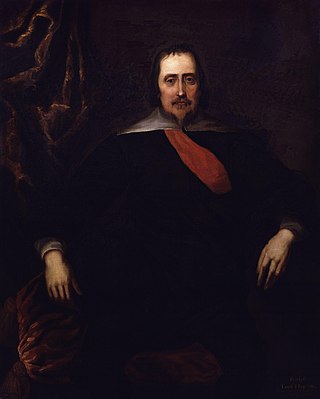
Ralph Hopton, 1st Baron Hopton was an English politician, military officer and peer. During the First English Civil War, he served as Royalist commander in the West Country, and was made Baron Hopton of Stratton in 1643.

Anthony Ashley Cooper, 1st Earl of Shaftesbury PC, FRS, was an English statesman and peer. He held senior political office under both the Commonwealth of England and Charles II, serving as Chancellor of the Exchequer from 1661 to 1672 and Lord Chancellor from 1672 to 1673. During the Exclusion Crisis, Shaftesbury headed the movement to bar the Catholic heir, James II, from the royal succession, which is often seen as the origin of the Whig party. He was also a patron of the political philosopher John Locke, with whom Shaftesbury collaborated with in writing the Fundamental Constitutions of Carolina in 1669.

Sir Francis Windebank was an English politician who was Secretary of State under Charles I.
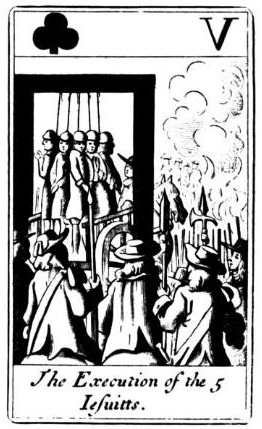
The Popish Plot was a fictitious conspiracy invented by Titus Oates that between 1678 and 1681 gripped the Kingdoms of England and Scotland in anti-Catholic hysteria. Oates alleged that there was an extensive Catholic conspiracy to assassinate Charles II, accusations that led to the executions of at least 22 men and precipitated the Exclusion Bill Crisis. During this tumultuous period, Oates weaved an intricate web of accusations, fueling public fears and paranoia. However, as time went on, the lack of substantial evidence and inconsistencies in Oates's testimony began to unravel the plot. Eventually, Oates himself was arrested and convicted for perjury, exposing the fabricated nature of the conspiracy.

The Cambridge Platonists were an influential group of Platonist philosophers and Christian theologians at the University of Cambridge that existed during the 17th century. The leading figures were Ralph Cudworth and Henry More.
Walter Aston, 2nd Lord Aston of Forfar was the second and eldest surviving son of Walter Aston, 1st Lord Aston of Forfar, and Gertrude Sadleir, daughter of Sir Thomas Sadleir of Standon, Hertfordshire, and his second wife Gertrude Markham. Lady Aston was the granddaughter of the noted Elizabethan statesman Sir Ralph Sadler.
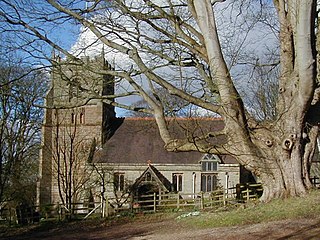
Beoley is a small village and larger civil parish north of Redditch in the Bromsgrove District of Worcestershire. It adjoins Warwickshire to the east. The 2021 census gave a parish population of 984, mostly at Holt End. The parish includes the hamlet of Portway, adjacent to the A435 road. It adjoins the Redditch suburb of Church Hill and the civil parishes of Alvechurch, Tanworth-in-Arden, Mappleborough Green and Wythall.
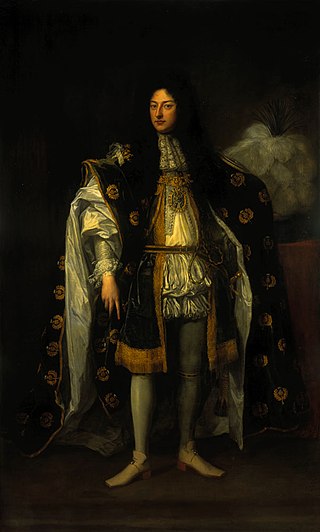
John Drummond, 1st Earl of Melfort, styled Duke of Melfort in the Jacobite peerage, was a Scottish politician and close advisor to James II. A Catholic convert, Melfort and his brother the Earl of Perth consistently urged James not to compromise with his opponents, contributing to his increasing isolation and ultimate deposition in the 1688 Glorious Revolution.
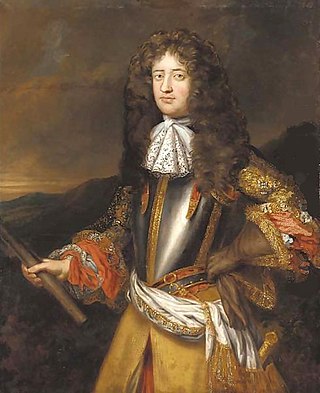
Major-General George Douglas, 1st Earl of Dumbarton KT was a Scottish military officer who spent much of his career in the service of King Louis XIV. In 1678, he returned to England; as a Catholic, he was a trusted servant of King James II and went into exile with him after the 1688 Glorious Revolution. He died at the palace of St Germain-en-Laye in March, 1692.

Elizabeth Cary, Viscountess Falkland was an English poet, dramatist, translator, and historian. She is the first woman known to have written and published an original play in English: The Tragedy of Mariam. From an early age, she was recognized by her contemporaries as an accomplished scholar.

Major General Charles Trelawny, also spelt 'Trelawney', was an English soldier from Cornwall who played a prominent part in the 1688 Glorious Revolution, and was a Member of Parliament for various seats between 1685 and 1713.
Henry Bertie, JP, of Chesterton, Oxfordshire was an English soldier and Tory politician who sat in the English and British House of Commons between 1678 and 1715.

Sir Edward Villiers was an English Royalist soldier and courtier. Part of the powerful Villiers family, he was a friend of Edward Hyde, chief advisor to Charles I and Charles II from 1641 to 1668.

Robert Leke, 3rd Earl of Scarsdale was an English politician and courtier, styled Lord Deincourt from 1655 to 1681.
Thompson Cooper was an English journalist, man of letters, and compiler of reference works. He became a specialist in biographical information, and is noted as the most prolific contributor to the Victorian era Dictionary of National Biography, for which he wrote 1423 entries

Sir Robert Throckmorton, KG, of Coughton Court in Warwickshire, was a Member of Parliament and a distinguished English courtier. His public career was impeded by remaining a Roman Catholic.
Sir Francis Wythens SL KC of Eltham, Kent was a British judge and politician.
Ralph Sheldon (1623–1684) was an English Roman Catholic Royalist and an antiquary. In his will he bequeathed his library and manuscripts to the College of Arms, his country's authority over heraldry and pedigree.

The Cromwell family is an English aristocratic family descended from Hugh de Cromwell who came to England with William the Conqueror. Its most famous members are: Thomas Cromwell, 1st Earl of Essex; and, Oliver Cromwell, the Lord Protector. The line of Oliver Cromwell descends from Richard Williams, son of Thomas Cromwell's sister Katherine and her husband Morgan Williams.
 This article incorporates text from a publication now in the public domain : Herbermann, Charles, ed. (1913). "Edward Sheldon". Catholic Encyclopedia . New York: Robert Appleton Company. The entry cites:
This article incorporates text from a publication now in the public domain : Herbermann, Charles, ed. (1913). "Edward Sheldon". Catholic Encyclopedia . New York: Robert Appleton Company. The entry cites: 













